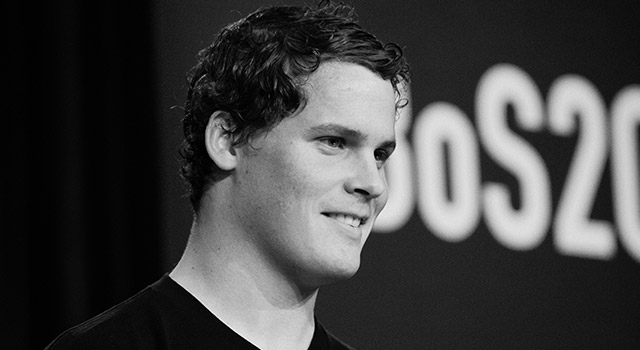
Any South African developer who has dabbled with WordPress is probably familiar with WooThemes or its spin-off product for e-commerce websites, WooCommerce, the companies Adii Pienaar co-founded with Magnus Jepson and Mark Forrester.
For Pienaar, life in a tech start-up started many years before WooThemes. His dad owned a computer shop in Brackenfell in Cape Town called Bits And PCs.
Pienaar, now 29, recalls having helped out at the shop when he was in his early teens. His dad was a programmer, which gave Pienaar exposure to software development from an early age.
“I used to do holiday work for my dad — for free, obviously — capturing financial data for his various companies,” he remembers. “What made that experience so great was that he did not expect me to just capture the data — he would explain the business principles behind it.” Seeing the internal cogs that drove business intrigued him.
Pienaar also has a rebellious nature and says that while he enjoys structure in his own life, he does not like it when structure is imposed on him.
During his high school years, he was exposed to the Internet and taught himself how to code HTML and began building websites for family and friends.
“It was an escape for me, being transported to a world where there were different possibilities.”
Pienaar matriculated in 2003 and went on to study accountancy at Stellenbosch, where he completed his BAcc degree. “I absolutely hated it. From the start, I realised that being an accountant puts you in a box and you have so many stakeholders that impose structure on what you are supposed to be doing, but it was a means to an end.”
In his honours year, he completed a BComm in business strategy.
His entrepreneurial spirit was kindled long before he developed his first WordPress theme. One of his first start-ups was a website he launched while at university that focused on showcasing pretty girls on campus — not dissimilar to what Mark Zuckerberg did with Facemash, a precursor to Facebook.
He also built a website that offered a classifieds advertising system aimed at wine estates.
“These websites were more of an adventure and about learning than actual businesses.”
It wasn’t until his final year at university, when he had to figure out how he would pay for his student bills, that he got into WordPress development and consulting. “My consulting is what led me to build my first theme.”
 At the end of 2007. Pienaar made the decision to commit fully to building a business out of it. He released his first theme, Premium News, which he sold to interested WordPress users for US$99 a pop.
At the end of 2007. Pienaar made the decision to commit fully to building a business out of it. He released his first theme, Premium News, which he sold to interested WordPress users for US$99 a pop.
It had five buyers on the first day and 20 in the first week, netting him about R10 000. At around the same time, Pienaar had already accepted a corporate job in Cape Town, but this was short-lived as the money he had made from selling his themes equalled the salary he was earning. After only two months, he quit his job to focus full time on theme development.
“Through my first theme I met Magnus and Mark and we loosely collaborated on building products. In March 2008, we formalised the business and became equal partners in WooThemes.”
WooThemes grew substantially and, in early 2009, the trio expanded the business by hiring the first team members.
It took WooThemes 13 months from launch to reach $1m in revenue.
WooCommerce was the next big project that Pienaar and the team took on. The idea came from customer feedback.
“We first started talking about commerce in late 2009. We knew there was something big with commerce on WordPress, and we weren’t happy with the solutions out there at the time.”
WooCommerce is a WordPress plugin that turns a website into a fully fledged e-commerce store.
Pienaar stepped down as CEO of WooThemes in May last year and six months later sold his shares.
“I wanted a new challenge,” he says. “The team at WooThemes was established and I had put a management team in place, so it felt like a natural time to move on.”
Pienaar immediately started working on an idea help other entrepreneurs. He built Public Beta, a community of clever people who share advice.
Public Beta was launched in August 2013 and made $4 000 in revenue its first week. Although it was doing well, Pienaar says he should have taken some time off after his departure from WooThemes. “I was negotiating my exit from WooThemes, selling my shares, and this was a hard process.”
Towards the end of 2013, he did not feel up to running Public Beta and ultimately paused development.

He took three months off to “reboot”, moving with his family to Paarl in the Cape winelands for a change of pace.
It was not until May this year when Pienaar read an article about marketing opportunities for online merchants sending out e-mail receipts. “I had a moment of absolute clarity and within five minutes I knew I wanted to build a product and a business to exploit that opportunity.”
He founded Receiptful, which will be launched commercially within the next three months. With this platform, Pienaar and a worldwide team of developers are trying to create a platform-agnostic e-commerce receipt product that can tap into various payment systems. For now they are building the product on Stripe’s API’s but Pienaar hopes to power the vast majority of e-commerce receipts in the coming years.
Apart from his entrepreneurial passions, Pienaar is also a husband and father to a three-year-old boy, with a baby on the way.
“I enjoy spending time with my family and I need to do that to be a better entrepreneur.”
Pienaar is also an avid runner and says he can lose himself while pounding the pavements. He says he is “slightly obsessive” about his running. His other passion is wine, and he’s an enthusiast wine collector.
Looking to the future, he says he would love to be a more prominent investor, using the angel investor mechanism to become more involved with other entrepreneurs. — © 2014 NewsCentral Media



